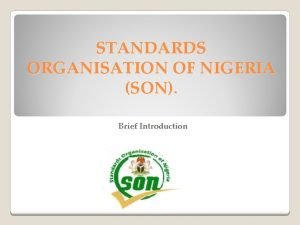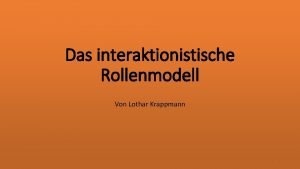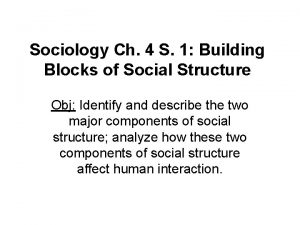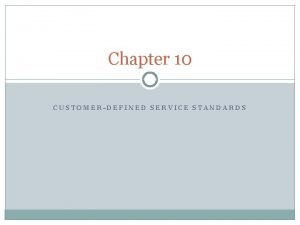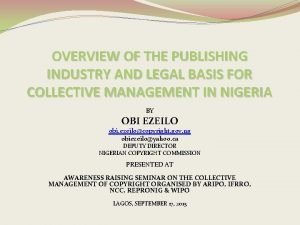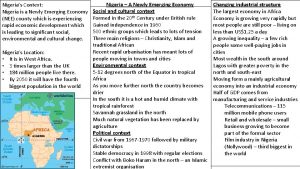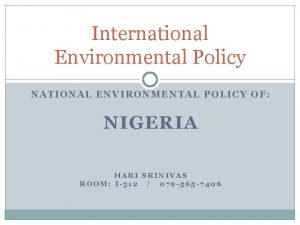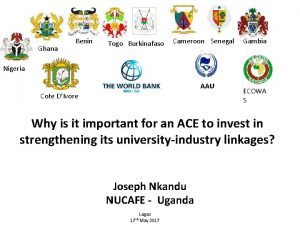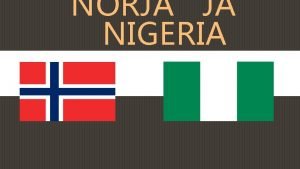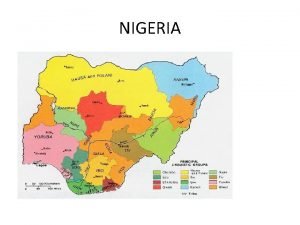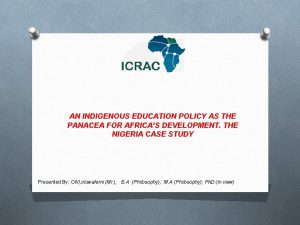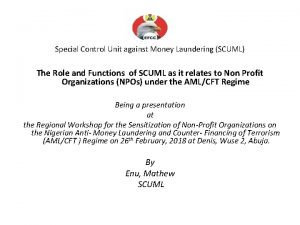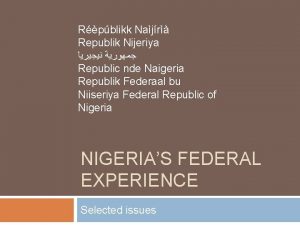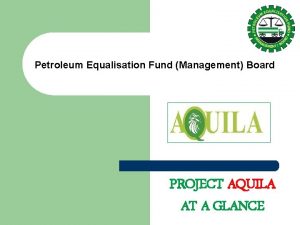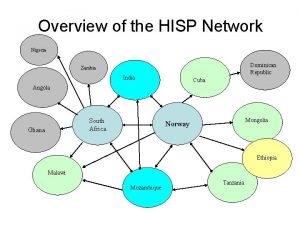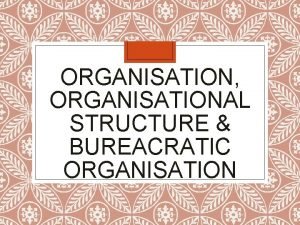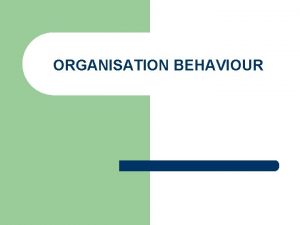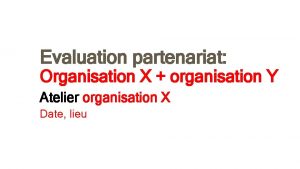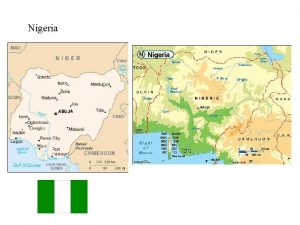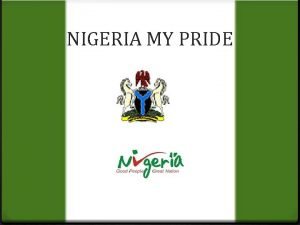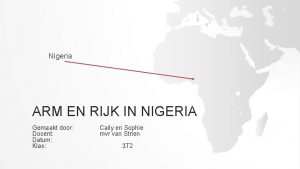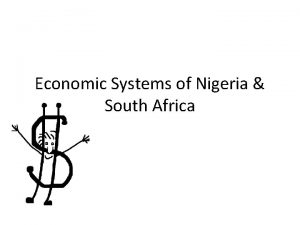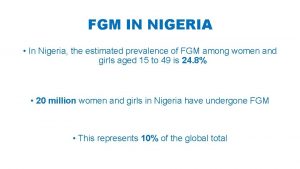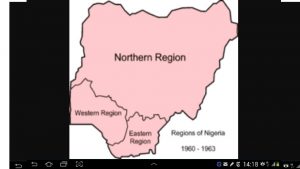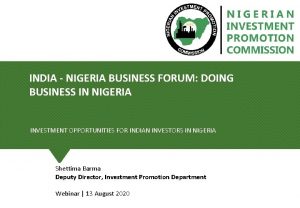THE ROLE OF STANDARDS ORGANISATION OF NIGERIA SON

































- Slides: 33

THE ROLE OF STANDARDS ORGANISATION OF NIGERIA (SON) IN FACILITATING NIGERIAN NON-OIL EXPORT THROUGH QUALITY ASSURANCE, STANDARDIZATION AND PACKAGING by OSITA ANTHONY ABOLOMA ESQ Director General/Chief Executive (SON) REPRESENTED BY ENGR. IRMIYA IJAI MAMZA DELTA STATE COORDINATOR, STANDARDS ORGANISATION OF NIGERIA 29 TH JANUARY, 2020

STANDARDS ORGANISATION OF NIGERIA (SON) • The STANDARDS ORGANISATION OF NIGERIA (SON) is the apex standardization body in Nigeria. • SON was established by SON Act No. 14, 2015, which repeals the Standards Organisation of Nigeria Act, Cap 59 laws of Federal Republic of Nigeria, 2004, and Enact the STANDARDS ORGANISATION OF NIGERIA Act. 2015 for the purpose of providing additional functions for the organisation, increasing penalty for violation, and for related matters. • This SON Act 2015 , has now replaced the Enabling Act No. 56 of 1971 which has three amendments: (Act No. 20 of 1978, Act No. 32 of 1984 and Act No. 18 of 1990).

Our Mission To promote consumer confidence and global competitiveness of Nigerian products and services through standardisation and quality assurance. To improve life through standardisation and quality assurance.

MANDATES OF SON These include; • To advise the Federal Government generally on the National Policy on Standards, specification quality control and metrology • To designate, establish and approve standards in respect of metrology, materials, commodities, structures and processes for the certification of products in commerce and industry throughout Nigeria • To provide the necessary measures for quality control of new materials and products in conformity with the standard • Organise tests and do everything necessary to ensure compliance with standards designated and approved by the council • Undertake investigation as necessary into quality of facilities, materials and products in Nigeria, and establish quality assurance system including certification of factories, products and laboratories

CONTEXTUAL CLARIFICATION • Product - The result/output of activities in a process • Quality- The degree to which a set of inherent CHARACTERISTICS fulfills REQUIREMENTS, or simply FITNESS for PURPOSE • Standard - Document that provide requirements, specifications, guidelines or characteristics that can be used consistently to ensure that materials, products, processes and services are fit for purpose. Categories include codes, technical specifications, code of practices, test methods/code among others

STANDARDISATION– PERFECT FITNESS

CONTEXTUAL CLARIFICATION… • Quality Assurance is aimed to avoid the defect whereas Quality control is aimed to identify and fix the defects. • Quality Assurance This provides assurance that quality requested will be achieved whereas Quality Control is a procedure that focuses on fulfilling the quality requested

CONTEXTUAL CLARIFICATION Quality assurance - All planned and systematic actions needed to demonstrate and provide adequate confidence that a product, service or result will satisfy given requirements for quality and be fit for purpose. Quality control - The operational techniques and activities used to fulfill requirements for quality Conformity - Demonstration that specified requirements relating to a product, process or system are fulfilled

CONTEXTUAL CLARIFICATION • Certification - Process by which a party gives a written assurance that a product, service, system, process or material conforms to specific requirements (a standard). It is a way of signaling to buyers, customers, suppliers and other stakeholders that an Organisation have implemented the standard properly • Packaging - Packaging can be described as a coordinated system of preparing goods for transport, warehousing, logistics, sale, and end use





PURPOSE OF PACKAGING • Packaging purposes, in relation to non-export, relates to all activities to achieve the following; • Information - The packaging conveys necessary information to the consumers. The common information that packaging provides include general features of the product, ingredients, net weight of the contents, name and address of the manufacturers, other information • Product Compliance - Packaging serves as means of indicating product information and constituents, in line with regulatory requirements • Product Certification – Packaging is also a means of displaying certification received by the product to indicating meeting quality requirements, e. g. MANCAP or NIS Certification marks

STANDARDISATION • Standardisation is the process of making something conform to standards • The process of implementing and developing standards based on consensus of different parties, firms, consumers, interest group, standards organisations and government. • Standardisation improves SKILLS, quality, productivity, morale, and reduces waste • Standardisation process results in a document called a STANDARD

WHAT ARE STANDARDS? • Standards are documented requirements to be satisfied by a material, product, process, service or system • They are documents containing specifications a product, system or services is expected to meet to satisfy consumer’s requirements. • This provides a useful tool in quality assurance, safety assurance, waste management and cost reduction. It serves as a guide for meeting minimum specification – e. g. minimum skill set requirements.

WHY STANDARDS • Standards creates orderliness • Standards ensures that goods and services consistently perform in the way they are intended in order to satisfy the needs of the consumer • Creates confidence for economic growth through improved access in local and international market • They improve the quality of life and influences employment • They promote good health and safety

AIM OF STANDARDISATION • Customer satisfaction • Compliance with regulatory requirements. • Competitiveness for local and International Market access • Business growth is enhanced • Business planning, Implementation, monitoring, evaluation and continuous improvement • Reduction in cost of doing business • Minimizes waste and losses

QUALITY ASSURANCE, PACKAGING AND STANDARDISATION • Quality assurance play a crucial role in production by ensuring that products meet certain thresholds of acceptability as stated in the applicable STANDARD, this is, meet specification listed out in a standard document. • Quality assurance programs and quality control policies all work to improve an organization's efficiency and profitability by reducing waste and ensuring that customer, regulatory and other stipulated requirements are complied with. • Packaging can also be viewed from the perspective of Quality Assurance in terms of preserving the integrity of product and as well as information on usage. • Both Quality Assurance and Packaging depend on Standardisation activities

SOME NON-OIL EXPORT PRODUCTS The following products have been identified as having potential for export in Nigeria. • Agricultural Products - The products are garlic, natural honey, potato, yam, cassava, onion, tomato, cucumber, vegetables, cabbage, chicken, goats, and milk. Others include fish, eggs, peas, beans, corn, okra, kola nuts, guava, mango, oranges, lemons, grapefruits, papayas, rice, and wheat. • These products may be exported processed or unprocessed, but must conform to specific requirements beforeign customers can accept them • Mineral Products – Solid minerals • Engineering Product - With the recent award of MANCAP Certification to Innoson Vehicle Manufacturing Nnewi, Nigeria can add vehicle as part of our non-oil exports • Fertilizers

HOW SON IS FACILITATING NON-OIL EXPORT? • Provision of standards and specification of minimum quality requirement for non-oil products • Provision of Management System Certification services • ISO 9001: 2015 – Quality Management System Certification • ISO 22000: 2018 – Food Safety Management System • ISO 14001: 2015 - Environmental Management System • Certification of Companies involved in production and or packaging of non-oil export • Certification of locally produced and or packaged non-oil products to MANCAP Certifications

CERTIFICATION FOR EXPORT • Certification is a mandatory requirement in most international trade, and evidence of it is needed before some countries allow foreign products into their markets. • SON is the Apex Certification body for Products in Nigeria

SON PRODUCT CERTIFICATION FOR QUALITY MARK • It is a process that assures on the conformance of a product or service to a standard through: • Facility inspection • Laboratory testing • A conforming product is recommended for the Mandatory Conformity Assessment Programme (MANCAP), which carries the globally acceptable quality mark • All products manufactured in Nigeria must be certified to the Nigeria Industrial Standards through MANCAP.

FACILITY INSPECTION FOR SON’S PRODUCT CERTIFICATION • Raw materials Inspection • In-process Inspection • Finished products Inspection • Packaging and Storage Inspection • Reviewing of past records of test • Finished products sampling and on-the-spot test • Representative samples of product(s) be collected for testing using SON and third-party facilities

OTHER SERVICES BY SON FOR STAKEHOLDERS AND EXPORTERS • Sales of National and Foreign Standards, NIS Directory, technical journals and SON publications • Database of store cards of information • Quality system and Environmental systems certification • Quality training in NIS ISO 9000, NIS ISO 14000, ISO 17025 & HACCP for food Standards • Laboratory Services relating to product testing/analysis • Instrument calibration • Factory Inspection for Product Type Certification (batchwise certification)

OTHER SERVICES BY SON FOR STAKEHOLDERS AND EXPORTERS… • Import Inspection of products • Pre-shipment Inspection of Exports • Consultancy services in Standardization, Quality Assurance, Testing, Import and Exports trade support • Product Registration • Market survey • Consumer Complaint & Collaboration • Human Resources Development and Training

WHY SON IS FACILITATING NON-OIL PRODUCTS? • To introduce the use of standards during skills acquisition and enterprise development • To promote the growth of enterprises. • To assist in the certification of products by entrepreneurs for enhanced patronage • Promoting the growth of the enterprises through monitoring with SON’s technical expertise • To enhance the competitiveness of the products for market access • To create National awareness on the importance of standards and MANCAP certification to Nigeria’s Industrial growth • To sensitize on the dangers or consequences of producing or patronizing fake or substandard products.

IMPACT OF SON ON SMEs • SON offers 50% Subsidized sale of products & services ( Standards charges , Certification charges, Laboratory testing charges). • MANCAP Certification of products within period of 60 Days • Collaborates with relevant stakeholders (BOI, NEPC, CAC, NEXIM, MAN and State Government) being facilitators of traade • SON and BOI has an existing MOU that facilitate processing of application for funds for MANCAP certified products

ADVANTAGES OF STANDARDIZATION TO NON-OIL PRODUCTS • Consideration of standards in skills and enterprise development • Enhancement of innovations • Consideration for consumer needs and satisfaction • Savings in cost of doing business • Continuous improvement

STAKEHOLDERS IN STANDARDIZATION • Inventors, Designers, Manufacturers and Producers • Farmers and Agricultural Businesspeople • Service Providers • Artisans/Craftsmen • Product Consumers

BENEFITS OF SON’S ACTIVITIES IN RELATION TO NIGERIAN MADE PRODUCTS • SON is laying the foundation to ensure that Nigerians, with prerequisite skills, can compete favourably in the world market by ensuring that they conform to the Quality sets by the Global market. • SON helps to eliminate some of the barriers associated with Exportation of goods. This also services to boost the confidence importers have on Nigerian goods by believing that a competent National Standards body is in charge of certification of goods before they are exported. • SON has also put a national programme in place that ensures all locally made goods conform to the applicable national/international standards. • NOTE: The main purpose of the concept of standardisation is to follow a logical process, starting with measurement and up to certification of products and services, a certification that can take the form of a certificate of competence.

CONCLUSION • It is everyone’s responsibility to work to achieve a better environment to enhance the contribution of the non-oil export sub-sector to the national economy. • The Standards Organisation of Nigeria (SON) is in the best position to provide the much needed information and support services to the industries. It is basically due to the fact that standards and certification are the central issues for the elimination of technical barriers to trade. Generally, SON has the resources, networks and facilities to gain access to the most up to date information on standards, certification and others. • SON also have the ready linkages with local industries and exporters, who are eventual endusers of this information. In addition, SON is the National Point for trade related technical barriers regulations under the arrangement of the World Trade Organisation (WTO), Such arrangement further enhance the role of SON in providing the necessary advisory services to exporters. • However, for the continued growth and development of Nigerian Industries, particularly in the context of export trade, we have little choice but to quickly put in place a comprehensive information strategy with the objective of providing the core of information which Nigerian industries would require to make important business decisions as well as to facilitate international trade.

THANK YOU Engr. I. I. MAMZA
 Standards organisation of nigeria
Standards organisation of nigeria Independent press standards organisation
Independent press standards organisation Azure worker role
Azure worker role Role making krappmann
Role making krappmann Role conflict occurs when fulfilling the role expectations
Role conflict occurs when fulfilling the role expectations Hard standards and soft standards examples
Hard standards and soft standards examples Laws guiding book publishing in nigeria
Laws guiding book publishing in nigeria Nigeria newly emerging economy
Nigeria newly emerging economy Universities that offer pharmacy in nigeria
Universities that offer pharmacy in nigeria Kasim balarabe
Kasim balarabe Environmental policy in nigeria
Environmental policy in nigeria Gifmis
Gifmis Cameroon xxxvideo
Cameroon xxxvideo Community development define
Community development define Máscara de cultura isoko nigeria
Máscara de cultura isoko nigeria Precious blood apostolate olo-nigeria
Precious blood apostolate olo-nigeria White fathers in nigeria
White fathers in nigeria Norjan bkt
Norjan bkt 250 ethnic groups in nigeria
250 ethnic groups in nigeria Nhmis
Nhmis Dr adeiga
Dr adeiga How do the governments of kenya and nigeria compare?
How do the governments of kenya and nigeria compare? Nigerian folk tales
Nigerian folk tales United purpose nigeria
United purpose nigeria Natural resources in nigeria
Natural resources in nigeria Nigeria
Nigeria Kaplan turbine
Kaplan turbine Coca cola nigeria
Coca cola nigeria Indigenous education in nigeria
Indigenous education in nigeria Scuml nigeria
Scuml nigeria Nigeria map with states
Nigeria map with states Aquila
Aquila Hisp nigeria
Hisp nigeria Nigeria behind the scenes
Nigeria behind the scenes
